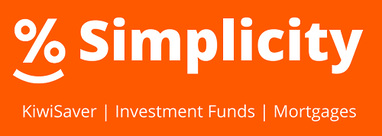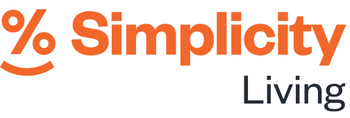Simplicity Investment Funds Review
The Simplicity Investment Funds offering delivers low-fee index funds to those willing to invest a minimum of $1,000 - we review the pros and cons of the fund offering
Updated 17 July 2024
Summary of Simplicity Investment Funds
- Funds: Simplicity Investment Funds offer ten funds:
- Diversified Funds - High Growth fund (launched April 2023), Growth fund, Balanced fund, Conservative fund and Defensive fund (launched April 2023) with 0.25% p.a. management fees. Simplicity launched its Homes and Incomes Fund in late 2023 and our stand-alone section below explains this unique fund.
- Single Sector Funds - NZ Shares fund and NZ Bond fund, with 0.10% p.a. management fees, and three further funds (launched in April 2023) Hedged Global Share Fund, Unhedged Global Share Fund and the Hedged Global Bond Fund, all with 0.15% p.a. management fees.
- Charity: The management company behind Simplicity operates as a not-for-profit, giving 15% of all fees (e.g. 15% of a diversified fund's 0.25% management fee) to the Simplicity Foundation. Simplicity also states that profits from any fees will be used to improve member services and reduce fees.
- Assets: Funds invest in cash, bonds, private equity, mortgages and the sharemarket; the mix depends on the risk profile of the fund.
- Performance: Simplicity publishes up to date performance here.
- Our view: We believe that the investment funds represent a strong offering for anyone looking to save outside of their KiwiSaver. The funds are largely low-risk, index fund trackers with low fees.
- As at 31 March 2023, around $3 billion was invested across five investment funds (before the launch of five more funds in April 2023). Based on the number of investors, there are significantly large balances which may suggest certain New Zealand 'rich' are choosing Simplicity to grow their wealth. The Growth Fund and NZ Share Fund are the most popular among investors.
Our Review
In this guide, we outline what the Simplicity Investment Funds are, the alternatives and must-know facts. We cover:
Please note: MoneyHub is not a Financial Adviser, and this guide has been published to explain the investment fundamentals and outline the pros and cons of the Simplicity Investment Funds as an option for managing money.
In this guide, we outline what the Simplicity Investment Funds are, the alternatives and must-know facts. We cover:
- The Funds
- The Simplicity Homes and Income Fund - Our Review of this Unique Fund
- Simplicity Q&A Section - Understanding Simplicity Living, Icehouse Ventures and Fund Investments
- Frequently Asked Questions
- The Competition - Simplicity Investment Funds and the alternatives
- The Bottom Line and Limitations
- Must-Know Facts about Simplicity
- How Safe is My Money?
- Conclusion
Please note: MoneyHub is not a Financial Adviser, and this guide has been published to explain the investment fundamentals and outline the pros and cons of the Simplicity Investment Funds as an option for managing money.
Investor Overview: Understanding Simplicity Living
Why is Simplicity doing this? I thought it was focused on index funds that invested in local and global sharemarkets? Why is it building houses and managing tenants?
Our view: It's too early to tell how profitable Simplicity Living will be, and we look forward to further explanations around how profits are distributed to KiwiSaver investors. However, concerning financial risk, the exposure to KiwiSaver members is limited as each fund is heavily diversified.
When Simplicity Living was first announced to existing KiwiSaver members, there was plenty of discussion and debate about the idea (and how it would affect KiwiSaver investors). This Reddit Personal Finance NZ thread is the leading example, alongside commentary around a news story expanding on the initiative.
- In 2021, Simplicity embarked on an extensive build-to-rent housing program with leading home builder NZ Living. This project aims to construct high-quality apartments and townhouses for long-term rental across New Zealand, offering an additional housing solution for many Kiwis.
- Simplicity Living is funded by certain funds within the Simplicity KiwiSaver Scheme (excluding its default fund) and the Simplicity Investment Funds. It uses investor money to construct these homes through a wholesale funding arrangement. As a result, anyone who invests in Simplicity will benefit from forecasted capital growth and income generated.
- To get a background of the projects (and where investor money is going), visit the Simplicity Living website.
Why is Simplicity doing this? I thought it was focused on index funds that invested in local and global sharemarkets? Why is it building houses and managing tenants?
- Simplicity's mission is to demonstrate that "doing good while making money" is possible. Simplicity believes that rental housing offers reliable returns for its investors, alongside bank deposits and bonds it invests into. Simplicity is arguably diversifying investor money away from cash assets and working to solve the housing shortage issue, and believes positive returns can be generated by doing so.
- The idea is that by building warm, dry, and affordable homes within communities, Simplicity aims to prevent costly health and social issues as part of its overall 'doing good' business practice.
- Since launching its house-building program, Simplicity has stated that the investments are designed to maximise benefits for its investors, and it's a strategy consistent with large pension funds worldwide that also own and rent homes long-term.
Our view: It's too early to tell how profitable Simplicity Living will be, and we look forward to further explanations around how profits are distributed to KiwiSaver investors. However, concerning financial risk, the exposure to KiwiSaver members is limited as each fund is heavily diversified.
When Simplicity Living was first announced to existing KiwiSaver members, there was plenty of discussion and debate about the idea (and how it would affect KiwiSaver investors). This Reddit Personal Finance NZ thread is the leading example, alongside commentary around a news story expanding on the initiative.
The Specs of the Simplicity Investment Funds
Simplicity offers ten investment funds which operate in two groups. The 'diversified' funds comprise of the Defensive, Conservative, Balanced, Growth and High Growth funds. The 'single sector' funds comprise of the NZ Bond, NZ Share, Hedged Global Share, Unhedged Global Share and Hedged Global Bond funds.
We outline the composition of these ten funds in detail:
We outline the composition of these ten funds in detail:
Diversified Funds:
More details: Visit Simplicity
1. Defensive Fund
Simplicity's most conservative fund, with 95% in income assets (44% New Zealand fixed interest, 36% International fixed interest, and 15% cash and cash equivalents), with 5% in growth assets (unlisted property).
More details: Visit Simplicity
2. Conservative Fund
- Fees: 0.25% p.a.
- This fund invests largely in fixed-income (78%) and cash (2%), leaving exposure to the sharemarket of 20% of funds invested, with most of the risk in overseas shares.
- Based on the investment mix, the fund is the least aggressive Simplicity investment fund (along with the NZ Bond fund) offered.
The fund comprises of:
- Intl Fixed Income 39%
- NZ Fixed Interest 39%
- Intl Shares 12%
- NZ Shares 4%
- Australian Shares 4%
- Cash 2%
More details: Visit Simplicity
3. Balanced Fund
- Fees: 0.25% p.a.
- This fund is a bridge between the Conservative fund above and the Growth fund below, offering a midway point for someone looking for higher returns without high risk. As such, the fund is 56% shares and 44% fixed income.
The fund comprises of:
- Intl Shares 36%
- Intl Fixed Income 21%
- NZ Fixed Interest 21%
- NZ Shares 10%
- Australian Shares 10%
- Cash 2%
More details: Visit Simplicity
4. Growth Fund
- Fees: 0.25% p.a.
- 86% of the fund is invested in shares in New Zealand and around the world. The return and value of this fund will depend heavily on how international sharemarkets are performing.
The fund comprises of:
- Intl Shares 58%
- NZ Shares 14%
- Australian Shares 14%
- Intl Fixed Income 6%
- NZ Fixed Interest 6%
- Cash 2%
More details: Visit Simplicity
5. High Growth Fund
The most aggressive fund Simplicity offers, with 98% in growth assets (73% International shares, 15% New Zealand shares, and 10% unlisted property), and 2% in income assets (2% cash and cash equivalents). As with the Growth Fund, the return and value of the High Growth fund will depend heavily on how international sharemarkets are performing.
The fund comprises of:
- Intl Shares 73%
- NZ Shares 15%
- Unlisted Property 10%
- Cash 2%
More details: Visit Simplicity
Single Sector Funds:
1. NZ Bond Fund
2. NZ Share Fund
3. Hedged Global Share Fund
4. Unhedged Global Share
5. Hedged Global Bond
- Fees: 0.10% p.a.
- The NZ Bond Fund invests in New Zealand Government bonds and investment grade, liquid bonds issued in New Zealand dollars, designed to be the New Zealand bond component of a diversified investment portfolio. In the last fund update, the investments were primarily NZ Government bonds, maturing between 2021 and 2037 and rated AA+.
- More details: Visit Simplicity
2. NZ Share Fund
- Fees: 0.10% p.a.
- The NZ Share Fund invests in the largest and most ethical 36 companies listed in the New Zealand stock exchange (NZX). The fund covers 97% of the market capitalisation of the NZX; ESG screens and removes certain companies (i.e. SkyCity). Companies included in the fund include Air New Zealand, Auckland International Airport, Contact Energy and Westpac.
- More details: Visit Simplicity
3. Hedged Global Share Fund
- Fees: 0.15% p.a.
- This fund invests in shares across developed markets and tracks the Bloomberg DM ex NZ ESG Screened Index and is designed to be the hedged global share component of a diversified investment portfolio.
- More details: Visit Simplicity
4. Unhedged Global Share
- Fees: 0.15% p.a.
- Just like the fund above, this fund invests in shares across developed markets and tracks the Bloomberg DM ex NZ ESG Screened Index. It's difference is that it's unhedged.
- More details: Visit Simplicity
5. Hedged Global Bond
- Fees: 0.15% p.a.
- This fund invests in high-quality bonds from developed countries, aiming to balance investment risk. It follows the Bloomberg MSCI Global Aggregate SRI Exclusions Float Adjusted Index, with hedging for New Zealand dollars, making it a suitable option for a diversified investment portfolio.
- More details: Visit Simplicity
The Simplicity Homes and Income Fund - Our Review of this Unique Fund:
The new Simplicity Homes and Income Fund is designed for traditional property investors, term depositors and others seeking growth and income investments. The fund is part of Simplicity's stated aim of investing to provide thousands of new homes across New Zealand via Long Term Rental Homes, Low Cost First Home Mortgages and Community Homes.
The fund's target investments are:
Our View:
Fund facts:
Who does this fund suit?
The fund's target investments are:
- 25% in rental properties built and rented by Simplicity Living.
- 25% in first home mortgages loaned by Simplicity. It's floating rate mortgages.
- 10% in mortgages for community housing and;
- 40% in bank deposits and bonds. This provides investors with access to all their money at any time.
Our View:
- Simplicity has, for some time, been investing in these areas with its KiwiSaver and Investment Funds for three years, with over $300 million already invested. We see the Homes and Income Fund as a concentrated exposure in areas Simplicity already invests in with its KiwiSaver funds.
- The Rental Properties are built, owned, and operated by Simplicity Living, which is 100% owned by the Simplicity KiwiSaver and Investment funds that invest in them. Simplicity Living pays a 10% return to the funds during the construction of rental homes, with any other development profits and rental income going back to the funds, too.
- It's too early to say how successful investing in rental homes will be, but it has generally been a successful investment strategy for pension and investment funds overseas - this Forbes article from 2022 explains the reasons.
- The fund is currently Auckland-focused as all developments are in Auckland, but we understand there are plans to expand it nationwide. In the long term, we understand from press releases and media comments that Simplicity wants to build, own and operate thousands of rental homes.
Fund facts:
- The First Home Mortgages are loaned to Simplicity members at the floating rate and in the long term, Simplicity wants to lend to thousands of First Home buyers.
- Community Housing funding is made via Community Finance Ltd, a Not-For-Profit lender to community housing lenders nationwide. The fund buys bonds issued by Community Finance, which then on-lends the money as First Mortgages to help build Community Homes. While the bonds don't have credit ratings, they are secured by Government rental and mortgage subsidies, so they are considered low risk. Simplicity wants to fund thousands of Community Homes in the long term.
- Simplicity's commentary suggests the returns from investing in residential housing should be reliable over time. To ensure investors have access to all their money at any time, it also keeps a large amount of cash and fixed interest (around 40% in total) in the fund.
- This fund is a diversified approach to the NZ residential housing market, offering an alternative to investors who might otherwise want to buy investment properties.
- Because the fund earns income from rent and mortgage payments, it may offer more reliable returns over time than other investments (e.g., shares). Full access to your money at any time is an advantage over term deposits and other fixed-income and property investments.
- The fund charges a 0.25% p.a. fee, which is much lower than that of other funds offering exposure to the property market such as a REIT.
- However, the fund has a very high weighting to fixed income and while this gives investors access to their money, it can dilute returns over time.
Who does this fund suit?
- Investors wanting a fund with broad exposure to residential property.
- Investors wanting to provide funding for first home buyers and increase the number of rental homes and community houses.
- Investors happy to receive some gains and losses via property re-valuations and development margins.
- Investors wanting to pay low fees for an income-based fund.
Simplicity Q&A Section - Understanding Simplicity Living, Icehouse Ventures and Fund Investments
|
MoneyHub Founder Christopher Walsh comments:
"Simplicity is one of New Zealand's most dynamic KiwiSaver and investment funds managers. We asked their team to answer common questions to help understand their investments in Simplicity Living, Icehouse Ventures and DWS given their involvement in the funds Simplicity offers". "The answers below are provided by Simplicity and have not been edited. They are published in good faith and designed to help you build more of an understanding beyond our core review". Our Q&A covers: If you have any further questions you'd like us to include, please contact our research team. |
Christopher Walsh
MoneyHub Founder |
Simplicity Living
Q: Simplicity Living is an important part of Simplicity now. What are the expected returns, how is ROI measured, and how does it work? Can this be shown in graphs or videos?
Simplicity: Our long-term expected IRR is 6-8%, inflation-adjusted. This is a very attractive rate of return for this type of asset and reflects how much margin we save by vertically integrating the whole business, from buying land to managing the rentals.
Q: What is the anticipated maximum allocation for Simplicity Living per fund?
Simplicity: The allocations that we have just changed are likely to be the maximums for quite some time and maybe forever. So any adjustments from here will be small. And getting to the current maximum allocations will take several years to build and rent enough homes.
Q: Who are the development companies and shareholders involved in Simplicity Living projects?
Simplicity: Simplicity Living is the developer, owner and manager. The 100% shareholders of Simplicity Living are the funds that invest in the strategy. There are no external developers or shareholders.
Q: How big does Simplicity Living plan to get? What are its limits?
Simplicity: We are limited by the funds we can invest (in terms of maximum allocations per fund and the amount of money invested in these funds). We have a long-term aim to build, own and operate thousands of homes. That will take a long time to achieve and involve billions of dollars. Currently, we have 159 homes in build and another 350 in various stages of development on land that we already own.
Simplicity: Our long-term expected IRR is 6-8%, inflation-adjusted. This is a very attractive rate of return for this type of asset and reflects how much margin we save by vertically integrating the whole business, from buying land to managing the rentals.
Q: What is the anticipated maximum allocation for Simplicity Living per fund?
Simplicity: The allocations that we have just changed are likely to be the maximums for quite some time and maybe forever. So any adjustments from here will be small. And getting to the current maximum allocations will take several years to build and rent enough homes.
Q: Who are the development companies and shareholders involved in Simplicity Living projects?
Simplicity: Simplicity Living is the developer, owner and manager. The 100% shareholders of Simplicity Living are the funds that invest in the strategy. There are no external developers or shareholders.
Q: How big does Simplicity Living plan to get? What are its limits?
Simplicity: We are limited by the funds we can invest (in terms of maximum allocations per fund and the amount of money invested in these funds). We have a long-term aim to build, own and operate thousands of homes. That will take a long time to achieve and involve billions of dollars. Currently, we have 159 homes in build and another 350 in various stages of development on land that we already own.
Icehouse Ventures
Q: How much of each fund is invested into IceHouse Ventures? How have the returns been so far, and where can I read about ongoing updates to the portfolio of Icehouse investments Simplicity has put money into?
Simplicity: There are two different investments in Icehouse. One is our 12% stake in the company Icehouse Ventures itself, and the remainder is in their funds.
The returns are too early to judge, but the returns from our combined Private Equity and Venture Capital Funds have been approximately 20% for the last year. But past returns are not indicative of future returns.
We have plans to share more with our members about our Icehouse Ventures funds in the future via our website and various member communication channels, so watch this space.
Simplicity: There are two different investments in Icehouse. One is our 12% stake in the company Icehouse Ventures itself, and the remainder is in their funds.
The returns are too early to judge, but the returns from our combined Private Equity and Venture Capital Funds have been approximately 20% for the last year. But past returns are not indicative of future returns.
We have plans to share more with our members about our Icehouse Ventures funds in the future via our website and various member communication channels, so watch this space.
New and Existing KiwiSaver and Investment Funds
Q: Where can I find information on the contents of the Bloomberg DM ex NZ ESG Screened Index and the Bloomberg MSCI Global Aggregate SRI Exclusions Float Adjusted Index?
Simplicity: There is currently very limited information publicly available on the Bloomberg DM ex NZ ESG Screened Index and the Bloomberg MSCI Global Aggregate SRI Exclusions Float Adjusted Index.
Information on the various country, sector and industry allocations can be provided directly to members by contacting the Investor Services team via [email protected]. The exact components will be on the 'Where in the World is my Money' calculator on the Simplicity member website in a few weeks.
Q: Are global equities held directly by the investment manager to minimise tax leakage, and can you provide information on the relative split of equities by individual stock, geography, etc.?
Simplicity: The securities (bonds and shares) are held directly by the Investment Manager, and in turn, this has resolved the previous tax leakage issue which occurred. Information on the various country, sector and industry allocations can directly be provided to members by contacting the Investor Services team via [email protected], and additional information will be disclosed as part of the quarterly fund updates as well as via the Where in the World is my Money calculator on the Simplicity website in the coming weeks.
Q: Why does the unhedged Global Share fund have a risk rating of 5, while the hedged version has a higher risk rating of 6, despite hedging typically being considered a risk mitigation strategy?
Simplicity: The risk indicator is based on annualised standard deviations calculator using the change in returns from week to week or (if not available) from month to month over five years. This is essentially a measure of the volatility of the returns over the relevant period.
The more the actual weekly or monthly return differs from the average weekly or monthly return, the higher the standard deviation and the higher the volatility, which is reflected in the given risk ratings.
For the Hedged Global Share Fund to be more volatile, this would mean that the return on the NZD versus all the other local currencies held in the portfolio has been higher than normal over the calculated period, which gets reflected in the risk indicator. This will vary depending on the volatility of the NZD.
Q: Is "high growth fund" a proper name for a fund that allocates 10% to unlisted property? How does this allocation compare to benchmark indices like the S&P 500 regarding risk and return?
Simplicity: Yes, it is, as the majority of the returns from the fund for the next 1-5 years will be in the form of development profits. Whilst we think they will also be reliable profits, the level of the returns makes it appropriate for growth portfolios.
Part of the issue, though, is that development property is an asset class, and developed another. The way we are doing it, it is a bit of both. That makes classification harder, but the returns justify this over time.
Q: Simplicity plans to increase the Growth Fund's allocation to Icehouse and Simplicity Living (and other projects or related entities) from 7.5% to 17% for the Growth Fund. Can Simplicity explain more about this?
Simplicity: Increases to these levels, over time, are justified by the returns received to date, our confidence in the strategies, and the enduring competitive advantage we have.
There is very little concentration risk, as there are over 60 holdings in VC/PE (this number is likely to grow) and hundreds of apartments in multiple developments. This diversification will also grow over time. And we aren't aware of any conflicts of interest. Simplicity Living is 100% owned by our funds that invest in it.
Simplicity: There is currently very limited information publicly available on the Bloomberg DM ex NZ ESG Screened Index and the Bloomberg MSCI Global Aggregate SRI Exclusions Float Adjusted Index.
Information on the various country, sector and industry allocations can be provided directly to members by contacting the Investor Services team via [email protected]. The exact components will be on the 'Where in the World is my Money' calculator on the Simplicity member website in a few weeks.
Q: Are global equities held directly by the investment manager to minimise tax leakage, and can you provide information on the relative split of equities by individual stock, geography, etc.?
Simplicity: The securities (bonds and shares) are held directly by the Investment Manager, and in turn, this has resolved the previous tax leakage issue which occurred. Information on the various country, sector and industry allocations can directly be provided to members by contacting the Investor Services team via [email protected], and additional information will be disclosed as part of the quarterly fund updates as well as via the Where in the World is my Money calculator on the Simplicity website in the coming weeks.
Q: Why does the unhedged Global Share fund have a risk rating of 5, while the hedged version has a higher risk rating of 6, despite hedging typically being considered a risk mitigation strategy?
Simplicity: The risk indicator is based on annualised standard deviations calculator using the change in returns from week to week or (if not available) from month to month over five years. This is essentially a measure of the volatility of the returns over the relevant period.
The more the actual weekly or monthly return differs from the average weekly or monthly return, the higher the standard deviation and the higher the volatility, which is reflected in the given risk ratings.
For the Hedged Global Share Fund to be more volatile, this would mean that the return on the NZD versus all the other local currencies held in the portfolio has been higher than normal over the calculated period, which gets reflected in the risk indicator. This will vary depending on the volatility of the NZD.
Q: Is "high growth fund" a proper name for a fund that allocates 10% to unlisted property? How does this allocation compare to benchmark indices like the S&P 500 regarding risk and return?
Simplicity: Yes, it is, as the majority of the returns from the fund for the next 1-5 years will be in the form of development profits. Whilst we think they will also be reliable profits, the level of the returns makes it appropriate for growth portfolios.
Part of the issue, though, is that development property is an asset class, and developed another. The way we are doing it, it is a bit of both. That makes classification harder, but the returns justify this over time.
Q: Simplicity plans to increase the Growth Fund's allocation to Icehouse and Simplicity Living (and other projects or related entities) from 7.5% to 17% for the Growth Fund. Can Simplicity explain more about this?
Simplicity: Increases to these levels, over time, are justified by the returns received to date, our confidence in the strategies, and the enduring competitive advantage we have.
There is very little concentration risk, as there are over 60 holdings in VC/PE (this number is likely to grow) and hundreds of apartments in multiple developments. This diversification will also grow over time. And we aren't aware of any conflicts of interest. Simplicity Living is 100% owned by our funds that invest in it.
Further questions?
More Details: Simplicity has advised that if you would like to chat any of this through with their Managing Director, Sam Stubbs, feel free to call him on 021 491 547 or email him at [email protected].
Simplicity Investment Funds Frequently Asked Questions
What is the investment process and why are the management fees lower than other investment companies?
There are two fund managers involved. Firstly, the Simplicity team manage the New Zealand assets and are responsible for getting the lowest costs. The manager of offshore investments is German fund manager DWS International GmbH (DWS). DWS is listed on the Frankfurt Stock Exchange and manages over NZ$1.4 trillion globally. Simplicity uses DWS for specific portfolio diversification which keeps costs low for Kiwi investors. As the international investing is outsourced to DWS and New Zealand investment is index-based, there are no fund managers and investment analysts to pay. This allows the savings to be passed on to investors, hence the low 0.25% annual fee.
Simplicity started in 2016 – can I trust it and is it safe for me to invest?
- On the issue of trust, the answer is yes. Simplicity appoints government-owned Public Trust as their independent supervisor and custodian of its investment funds. Public Trust has been around for almost 150 years and is ‘guaranteed independent’ under the Public Trust Act 2001.
- Simplicity manages the New Zealand bonds and shares that they buy for the funds, while the international shares and bonds are managed by DWS. The investments are owned by Public Trust on behalf of the funds, not by Simplicity or DWS.
- Should Simplicity close down, your funds would be accessible given they are held in trust.
- With regards to whether it’s safe to invest, no fund is guaranteed, but the risk profile indicates where your money will be invested. This is the case with any managed fund, and not unique to Simplicity. If a Simplicity fund went ‘bad’, then you could see similar negative results in other funds given Simplicity heavily diversifies its investment in New Zealand and around the world.
The Competition - Alternative Index Funds Available to New Zealand Investors
Simplicity's NZ Share and NZ Bond funds are unrivalled by their fees, but alternative index funds and diversified funds are popular with other fund managers and platforms. We have reviewed the following, which should be considered alongside Simplicity's Investment Funds.
Beyond the above 'challenger' investment platforms, there are hundreds of funds offered by investment managers such as Fisher Funds, Milford Asset Management, Pie Funds and Harbour Asset Management, among others. While we've not completed extensive reviews of these options, we understand that none of the above options offer fees lower than the Simplicity funds, nor do they specialise in index funds.
- Kernel - offers several global and NZ-specific funds with low fees
- InvestNow - offers 100+ fund choices both New Zealand and overseas focused.
- Hatch - offers overseas exchange-traded funds, such as Vanguard, BlackRock, Invesco, State Street and 400+ others.
- Sharesies - offers New Zealand exchange-traded funds, socially responsible funds and other investment options.
- Tiger Brokers (NZ) - offers US, Australian and specific Asian-listed exchange-traded funds, such as Vanguard, BlackRock, Invesco, State Street and 500+ others.
Beyond the above 'challenger' investment platforms, there are hundreds of funds offered by investment managers such as Fisher Funds, Milford Asset Management, Pie Funds and Harbour Asset Management, among others. While we've not completed extensive reviews of these options, we understand that none of the above options offer fees lower than the Simplicity funds, nor do they specialise in index funds.
What Others Are Saying:
The New Zealand Herald published an article looking at the fees and how a Kiwi with $50,000 invested in the Simplicity growth fund over 10 years could be $13,000 better off than if an investment was made in an average fund. The [then 0.30% annual fee, later 0.29%, and as of 1 February 2024, 0.25%] compared favourably to other provider conservative fund fees which range between 0.97 per cent and 2.38 per cent, balanced fund fees which range between 1.16 per cent and 2.75 per cent and growth fees which range from 1.25 per cent to 2.93 per cent.
The New Zealand Herald published an article looking at the fees and how a Kiwi with $50,000 invested in the Simplicity growth fund over 10 years could be $13,000 better off than if an investment was made in an average fund. The [then 0.30% annual fee, later 0.29%, and as of 1 February 2024, 0.25%] compared favourably to other provider conservative fund fees which range between 0.97 per cent and 2.38 per cent, balanced fund fees which range between 1.16 per cent and 2.75 per cent and growth fees which range from 1.25 per cent to 2.93 per cent.
Who are the Simplicity Investment Funds Suited to?
Best For:
- Long-term investors looking for stability and growth in index-tracking funds.
- Short and medium term investments - the ease of investing makes them an option for anyone hoping to beat the returns of a term deposit. The funds accept automatic payments and there are no fees for making withdrawals.
- Any parent saving for their child. Long-term index funds are proven to be popular for those setting up a university fund when child is born.
- Also suitable for: Family trusts and companies wishing to invest cash for the long term.
- Not suitable for: Investors looking for aggressive, active funds that aim to beat the markets year on year.
The Bottom Line
- Unlike the slew of fund management companies in New Zealand, Simplicity's investment funds offer a 'set and forget' approach with its passive funds.
- The underlying rationale is that market investments always beat a fund manager in the long term, and as investing has a long-term focus, the risks are low and the return is seen to be reliable.
- Funds are updated daily so investors can see their portfolio value by logging in to the Simplicity website. However, there is a two day lag due to international prices which need to be finalised.
- There is also projected returns, a feel-good graph showing projected totals until you reach 65 years of age based on your previous contributions.
- The NZ Share Fund and Bond Fund are both structured as Portfolio Investment Entities (PIEs), meaning the top tax rate applied to returns is 28%.
- There are no entry or exit fees, and if you top up or withdraw any amount, there is no administration fee. The management fee charged will adjust accordingly based on the total amount invested.
- Relative to Simplicity's competition, its fund fees are 50-80% cheaper and routinely rank extremely high on fund performance tables published by Morningstar.
- Simplicity, unlike other fund managers, do not pay commissions or trail fees to financial advisors. This makes the funds more them attractive to investors who retain more of what’s theirs.
Simplicity Investment Funds Limitations
- If you’re looking for funds investing in specific industries, such as oil and gas, agriculture or mining, Simplicity is not for you.
- If you have less than $1,000 to invest, you'll need to save more or look at an alternative such as InvestNow, Sharesies, Kernel or Hatch.
- Simplicity's ideology is to invest in index funds and deliver investors market returns. If you're wanting a fund manager who actively invests anticipating to beat the market, Simplicity is not for you.
Must-Know Facts about the Simplicity Investment Funds
The performance of most of the investment funds will largely depend on the movements of sharemarketsWith the exception of the NZ Bond fund, all the investment funds follow the New Zealand, Australian and/or overseas sharemarkets. Because of this, the day-to-day is not important, but rather the year-on-year return. New Zealand markets may not be volatile, but that's not the story overseas. Because the funds follow an index, the companies invested in are profit-orientated.
|
The Simplicity investor fund fees are the lowest in the managed funds marketMany fund managers charge annual fees amounting to 1%, 1.5% or even 2%+ of your investment. With the NZ Share and NZ Bond funds, you'll pay 0.10% p.a. This works out to be $1 per year for every $1,000 invested. Alongside Kernel, Simplicity is pushing fees lower and lower which is great news for investors.
The diversified funds (Defensive, Conservative, Balanced, Growth and High Growth) charge 0.25%, or $2.50 per $1,000 invested. Again, this is lower or the same than the fees charged by index-fund investment options like Smartshares and Kernel (0.29% p.a. if you invest over $25,000). Low management fees make a significant difference to your overall fund performance in the long term, given the compounding effect of money. For example, $10 saved in fees on a fund returning 10% p.a. would be worth $174.49 after 30 years. Many fund managers like to charge serious investors more than $10 per year in management fees. |
Simplicity Investment Funds follow a proven investment model by investing in index fundsIndex funds historically outperform managed funds. According to Fortune Magazine, the S&P 500 (an American sharemarket index) outperformed more than 82% of all active funds over a 15-year period. Given the low fees an index fund charges and the reliability in outperforming active funds, it's a relatively conservative approach to investment for your retirement.
|
Simplicity operates as a non-profit enterprise, meaning it returns excess fees back to its investors (i.e. you)Simplicity is profit-orientated when it comes to investments, but Simplicity's management company is a not-for-profit owned by a registered charity. This means that the 0.10% - 0.25% annual management fee on your investment funds may exceed what's required to operate the fund. In such cases, Simplicity pledges to return the excess to every investor. This is very different from almost all other fund managers who distribute the profits, driven by management fees, to themselves.
Know this: 15% of management fees go to charity
|
How Safe is my Money with Simplicity?
- Simplicity is a licensed Fund Manager regulated by the Financial Markets Authority. When you invest in any Managed Investment Scheme, the manager does not get any of the money (apart from any fees it charges you).
- The money goes into the Scheme’s bank account controlled by the Scheme’s Supervisor. In Simplicity's case, that is Public Trust. Your money is then invested in shares and bonds that are owned by the Scheme, and you become a member of the Scheme.
- Simplicity manages the Scheme for you, and Public Trust makes sure they are managing the Scheme’s investments in line with the rules and regulations set out in the Scheme’s documents.
- If for any reason Simplicity was to run into difficulties, your investments would not be affected. The Scheme’s investments would be transferred to another manager.
- Simplicity manages the New Zealand bonds and shares, while the international shares and bonds are managed by DWS, but the investments are owned by the Scheme, not by Simplicity or DWS.
- Simplicity is not a Government guaranteed investment; therefore, it is no different from other investments, including bank deposits.
- A market downturn will not impact your ability to withdraw funds from your account. Your funds are invested in liquid securities that can be realised at 2 days’ notice if necessary. If there was a significant financial crisis, it is possible there could be some kind of impact on your ability to access your funds for a few days. There were instances of this in 2008, although that generally related to structured products of some kind, and Simplicity does not hold that type of investment.
- Simplicity's funds are very widely diversified across asset classes. This means that market movements tend to be smoothed out to a degree as different markets and countries do not have exactly the same performance.
Simplicity and Cyber Security:
- As an online business, Simplicity takes the security of member personal data seriously, and they are confident any client data stored (as required by various regulations) is secure.
- Once the application to join the scheme is submitted, the transmission of this information is encrypted and can not be intercepted.
- Simplicity also has other internal controls and measures in place to ensure that member data is held in a secure manner. They do not hold member information on any devices and utilise cloud-based services offered by Amazon Web Services (AWS) to hold their data.
Our Conclusion
- We think the Simplicity Investment Funds are one of the most attractive passive investing options available to everyday New Zealanders alongside Kernel's range on funds. While the $1,000 minimum investment is on the higher side, Simplicity's commitment to low fees suggests it is focused on creating wealth for investors.
- With investments funnelled into New Zealand, Australian and international bank deposits, bonds and shares, Simplicity offers many passive funds to Kiwis looking for a steady return in the long term without active management.
- The funds are transparent, honest and ethical. As an example, the NZ Share fund (which invests in New Zealand's largest companies on the NZX50) purposefully excludes Sky City.


















